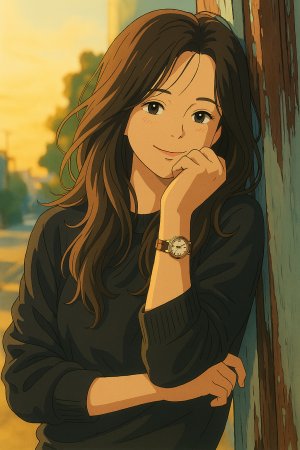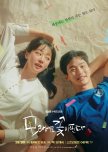Like Flowers in Sand - A Love Rekindled, A Story Mismanaged
Korean dramas have a knack for taking niche subjects and turning them into deeply engaging stories. So when Like Flowers in Sand promised a slice-of-life drama centered around ssireum, a traditional Korean wrestling sport, and paired it with a second-chance romance, it seemed like a fresh and exciting premise. Add to that Jang Dong-yoon and Lee Joo-myung, two charismatic leads with crackling chemistry, and it should have been a surefire win. Instead, the drama took an unexpected detour—one that led it away from its strongest elements and into a police procedural subplot that nobody asked for.
Jang Dong-yoon shines as Kim Baek-doo, a ssireum wrestler on the brink of retirement. He plays Baek-doo with an endearing mix of warmth, determination, and quiet vulnerability. His internal conflict—whether to keep fighting for his passion or let go of a sport he’s dedicated his life to—could have been the emotional heart of the series. Meanwhile, Lee Joo-myung brings a grounded strength to Oh Yoo-kyung, Baek-doo’s childhood friend turned undercover detective. Their dynamic is easily one of the best parts of the show. There’s an easy familiarity between them, a deep-rooted bond that makes their rediscovery of each other’s feelings feel natural and rewarding. When they’re together on screen, the drama feels alive, full of the kind of push-and-pull romance that makes second-chance love stories so compelling.
Even the supporting cast brings a lot of warmth and personality to the table. The camaraderie among the ssireum team members and townspeople adds layers of charm. There’s a real sense of community that makes you want to root for these characters, even if their individual arcs don’t always get the attention they deserve. The drama does a great job in its early episodes establishing the struggles of a dying sport and the people trying to keep it alive, which makes it all the more frustrating when the focus abruptly shifts.
Because here’s where Like Flowers in Sand stumbles—the murder investigation. What starts as a promising story about a fading sport and a wrestler’s personal journey suddenly gets hijacked by a crime subplot that feels like it wandered in from another show. Instead of deepening the emotional core of the drama, the investigation sidetracks it entirely. The pacing becomes uneven, with the second half of the series devoting more time to solving a crime than exploring the relationships that made the first half so engaging. This wouldn’t have been as much of an issue if the mystery itself was compelling, but it’s neither complex nor suspenseful. By the time the culprit is revealed—a rice cake shop owner whose motivations barely register—the entire storyline feels like an afterthought.
It’s hard not to see the wasted potential here. The ssireum element of the drama is beautifully shot and carries so much cultural significance, yet it gets sidelined in favor of a generic whodunit. Baek-doo’s personal struggles, his teammates’ efforts to keep the sport alive, and the deep emotional ties within the town could have provided all the drama necessary to keep viewers invested. Instead, the show stretches itself too thin, trying to balance multiple genres—romance, comedy, thriller, slice-of-life—and in the end, it doesn’t fully succeed at any of them.
What makes this even more disappointing is that when the drama does lean into its strengths—Baek-doo and Yoo-kyung’s relationship, the training sequences, the small-town charm—it absolutely works. The moments where Baek-doo struggles with his love for ssireum, where his teammates rally around him, where Yoo-kyung finds herself torn between her duty and her past—these are the moments that make Like Flowers in Sand worth watching. But they’re too often interrupted by the forced urgency of the crime plot, which never quite fits with the rest of the show’s tone.
It’s not that a sports drama can’t have a mystery subplot, but the balance has to be right. Here, it feels like the writers lost confidence in their original story and decided to throw in a murder case to up the stakes. But in doing so, they undermined the emotional weight of the show. Instead of watching Baek-doo grapple with his identity and future, we’re watching a lackluster crime unfold. Instead of exploring the depths of Yoo-kyung’s character as she reconnects with her past, we’re following her through uninspired detective work. The shift in focus ultimately does more harm than good.
Verdict: By the time the finale rolls around, there’s a lingering sense of disappointment. The drama had all the right ingredients to be a standout slice-of-life story, but it got lost in trying to do too much. The romance, the sport, the community—the things that made the show special—are still there, but they’re drowned out by a plotline that never should have been the centerpiece. If Like Flowers in Sand had just trusted its own premise, it could have been something truly unique. Instead, it’s a drama that flirts with brilliance but never fully commits, leaving viewers with a sense of what could have been.
Final Score: 6/10
Jang Dong-yoon shines as Kim Baek-doo, a ssireum wrestler on the brink of retirement. He plays Baek-doo with an endearing mix of warmth, determination, and quiet vulnerability. His internal conflict—whether to keep fighting for his passion or let go of a sport he’s dedicated his life to—could have been the emotional heart of the series. Meanwhile, Lee Joo-myung brings a grounded strength to Oh Yoo-kyung, Baek-doo’s childhood friend turned undercover detective. Their dynamic is easily one of the best parts of the show. There’s an easy familiarity between them, a deep-rooted bond that makes their rediscovery of each other’s feelings feel natural and rewarding. When they’re together on screen, the drama feels alive, full of the kind of push-and-pull romance that makes second-chance love stories so compelling.
Even the supporting cast brings a lot of warmth and personality to the table. The camaraderie among the ssireum team members and townspeople adds layers of charm. There’s a real sense of community that makes you want to root for these characters, even if their individual arcs don’t always get the attention they deserve. The drama does a great job in its early episodes establishing the struggles of a dying sport and the people trying to keep it alive, which makes it all the more frustrating when the focus abruptly shifts.
Because here’s where Like Flowers in Sand stumbles—the murder investigation. What starts as a promising story about a fading sport and a wrestler’s personal journey suddenly gets hijacked by a crime subplot that feels like it wandered in from another show. Instead of deepening the emotional core of the drama, the investigation sidetracks it entirely. The pacing becomes uneven, with the second half of the series devoting more time to solving a crime than exploring the relationships that made the first half so engaging. This wouldn’t have been as much of an issue if the mystery itself was compelling, but it’s neither complex nor suspenseful. By the time the culprit is revealed—a rice cake shop owner whose motivations barely register—the entire storyline feels like an afterthought.
It’s hard not to see the wasted potential here. The ssireum element of the drama is beautifully shot and carries so much cultural significance, yet it gets sidelined in favor of a generic whodunit. Baek-doo’s personal struggles, his teammates’ efforts to keep the sport alive, and the deep emotional ties within the town could have provided all the drama necessary to keep viewers invested. Instead, the show stretches itself too thin, trying to balance multiple genres—romance, comedy, thriller, slice-of-life—and in the end, it doesn’t fully succeed at any of them.
What makes this even more disappointing is that when the drama does lean into its strengths—Baek-doo and Yoo-kyung’s relationship, the training sequences, the small-town charm—it absolutely works. The moments where Baek-doo struggles with his love for ssireum, where his teammates rally around him, where Yoo-kyung finds herself torn between her duty and her past—these are the moments that make Like Flowers in Sand worth watching. But they’re too often interrupted by the forced urgency of the crime plot, which never quite fits with the rest of the show’s tone.
It’s not that a sports drama can’t have a mystery subplot, but the balance has to be right. Here, it feels like the writers lost confidence in their original story and decided to throw in a murder case to up the stakes. But in doing so, they undermined the emotional weight of the show. Instead of watching Baek-doo grapple with his identity and future, we’re watching a lackluster crime unfold. Instead of exploring the depths of Yoo-kyung’s character as she reconnects with her past, we’re following her through uninspired detective work. The shift in focus ultimately does more harm than good.
Verdict: By the time the finale rolls around, there’s a lingering sense of disappointment. The drama had all the right ingredients to be a standout slice-of-life story, but it got lost in trying to do too much. The romance, the sport, the community—the things that made the show special—are still there, but they’re drowned out by a plotline that never should have been the centerpiece. If Like Flowers in Sand had just trusted its own premise, it could have been something truly unique. Instead, it’s a drama that flirts with brilliance but never fully commits, leaving viewers with a sense of what could have been.
Final Score: 6/10
Was this review helpful to you?


 2
2 3
3 3
3





















